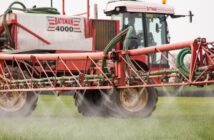With sustainability a constant pressure in the agriculture market, any new innovation that promises to help the sustainability agenda whilst also supporting a farmer’s commercial enterprises has got to be exciting, and this is exactly what Organo-Mineral Fertilizers (OMF) claim.
OMF have been available in Europe for some time but only came to the UK in 2021 in a very limited capacity. To test the sustainability claims and provide farmers with effective agronomic advice in using OMF, Yara started trial work in 2021.
Yara’s trials are being done in partnership with Cranford University and Dr Emma Burak, Sustainable Fertilizer Manager, joined Yara’s OMF project with her sole focus being the collection of data into the feasibility of OMF.
What is an organo-mineral fertilizer?
“Put very simply, it is a mixture of organic material and mineral fertilizer,” explains Natalie Wood, Agronomy operations manager at Yara. “By adding the mineral fertilizer to the organic matter, you’re able to increase the nitrogen percentage content which would otherwise, with organic matter alone, be quite low.”
The fertilizer itself looks very different to a traditional fertilizer. It has the appearance of a feed nut or chicken manure pellets. Natalie goes on to say: “We were initially concerned with the spreadability of the product, so these were some of the first tests we conducted, but actually we were really surprised with the results. It spreads easily up to 36 metres with 10% or less coefficient of variation and actually spread up to 42m with that percentage only increasing to 15% at most.”
Why are you so excited by OMF?
Fertilizers can be highly effective – how effective depends upon the type of fertilizer you use, what nutrients your soil and crops need, and how effectively you spread it. But many see the environmental cost of fertilizer being too high, which creates real issues for farmers. With food security becoming more of a concern, a growing population and less available land for agriculture, farmers are faced with the pressure to continually increase yield. Fertilizer is essential in achieving that. With OMF, we are potentially looking at a product that can return the harvests we need whilst reducing our impact on the environment.
Dr Emma Burak says: “Provided the product is made up mostly of recycled organic waste, then it fits really well into that sustainability agenda.” Emma goes on to explain “OMF products potentially provide two key benefits – it recycles a waste product creating a circular economy and by returning organic matter to the soil, you’re increasing soil health.”
Yara’s trials into OMF effectiveness are ongoing and being added to all the time. So far, trials have been set up on winter cabbage, oilseed rape, cover crops, and most recently spring barley. The visual results of OMF are promising – the visual results are comparable to that of mineral fertilizers.
Mrs Wood goes on to caution “The true test will of course be at harvest time, we need to ensure that there is no detrimental effect to the end quality and yield of the crops, but I’m so excited and proud to be involved in trialling such an innovative product. Yara have great green credentials and these OMF products are just the latest in a long line of environmental initiatives designed to assist farmers in meeting their environmental burden.”




